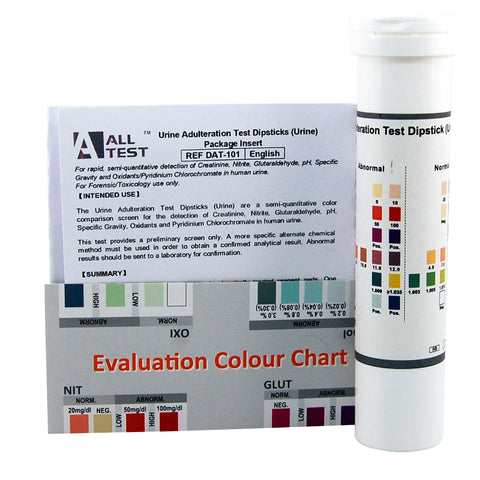Adulterants In Drug Testing
What does adulteration in drug testing mean?
Urine adulteration in drug testing refers to the deliberate manipulation or contamination of a urine sample to alter or mask the presence of drugs or their metabolites. This can involve adding substances to the urine to dilute the concentration of drugs, altering the pH level of the sample, or using various chemicals to interfere with drug detection tests. The aim of urine adulteration is to produce a false negative result, indicating the absence of drugs in the individual's system when they are actually present.
What is a urine adulteration test?
Urine adulteration tests are used to detect if a urine sample has been tampered with in an attempt to cheat on a drug test. Drug test kits typically include an adulteration test strip or a separate adulteration test kit that can be used to check for the presence of certain chemicals that may have been added to the urine sample.
The types of chemicals that may be detected by an adulteration test include oxidants, specific gravity adjusters, and pH adjusters. Oxidants such as bleach, hydrogen peroxide, and pyridinium chlorochromate can be added to a urine sample in an attempt to destroy drug metabolites. Specific gravity adjusters, such as salt or water, can be added to dilute the urine and lower the concentration of drugs. pH adjusters such as vinegar or lemon juice can be added to alter the acidity of the urine, which can affect the accuracy of drug test results.
What do adulteration test strips check for?
Urine adulteration test strips are used to help tell if a drug test has been tampered with.
The adulteration test strip or kit usually contains several pads that change color when exposed to certain chemicals. The test strip is dipped into the urine sample, and the pads are observed for color changes. If any of the pads change color, it may indicate that the sample has been tampered with. An adulteration test strip is now built into many integrated drug test cups that are used for workplace drug testing, to include tests for specific gravity, ph and oxidants. These three tests will pick up most forms of urine tampering.
It is important to note that adulteration tests are not foolproof, and may not detect all forms of tampering, but they will pick up most adulterants.
What are common adulterants in drug testing and how to spot them?
Adulterants are substances that may be added to a urine sample, in an attempt to cheat on a drug test. Adulterants attempt to mask the presence of drugs or alter the chemical composition of the urine, making it difficult to detect the presence of drugs.
Common urine adulterants that may be encountered in drug testing include:
- Water: Water is a common adulterant that is used to dilute the concentration of drugs in a urine sample, which can make it difficult to detect the presence of drugs during drug testing. If water is added to the urine sample to dilute it this is referred to as in vitro dilution. If excess water is ingested in the hours preceding the drug test, in an attempt to dilute the urine sample resulting in a false negative drug test result, this is referred to as in vivo dilution.
- Bleach: Bleach may be added to urine samples to interfere with the detection of drug metabolites, and make it difficult to detect drug use.
- Vinegar or Lemon Juice: Apple cider vinegar and lemon juice have been promoted as 'having cleansing properties" but there is little clinical evidence for this. be added to urine samples to alter the pH level of the urine and affect the accuracy of drug test results.
- Salt: Salt is added to urine samples to increase the specific gravity of the urine, making it appear more concentrated and potentially masking the presence of drugs.
- Creatinine: Creatinine is a chemical found in urine that is used to measure the concentration of drugs in the urine. Adding synthetic creatinine to a urine sample can make it appear as though the sample has not been tampered with.
- Adulteration products: There are products available in the market that are specifically designed to adulterate urine samples. These products contain a combination of various adulterants that can make it more difficult to detect drugs in the urine.
It is important to note that many cup drug testing kits for the workplace typically include adulteration test strips or separate adulteration test kits that can be used to detect the presence of certain chemicals in the urine sample. Using these adulteration tests can help identify if the urine sample has been adulterated and ensure accurate drug test results.
The following urine drug test kits contain an inbuilt adulteration test strip
- 10 panel split key cup urine drug test kit with adulteration test and temperature strip
- 10 panel screw lid cup drug test kit with adulteration test
- 11 panel cup urine drug test kit with adulteration test strip
- 13 panel cup urine drug test kit with adulteration test and temperature strip
- 17 panel cup urine drug test kit with adulteration test and temperature strip

